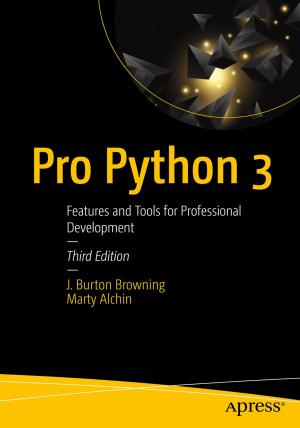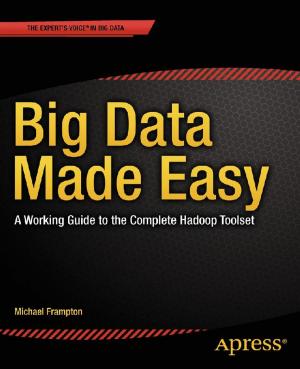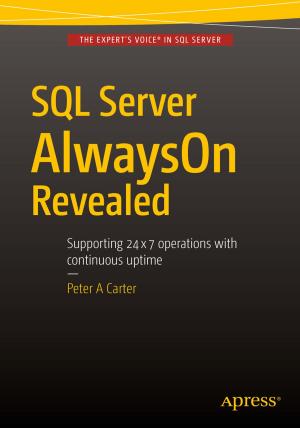Bad Programming Practices 101
Become a Better Coder by Learning How (Not) to Program
Nonfiction, Computers, Programming, Software Development, General Computing| Author: | Karl Beecher | ISBN: | 9781484234112 |
| Publisher: | Apress | Publication: | February 8, 2018 |
| Imprint: | Apress | Language: | English |
| Author: | Karl Beecher |
| ISBN: | 9781484234112 |
| Publisher: | Apress |
| Publication: | February 8, 2018 |
| Imprint: | Apress |
| Language: | English |
This book takes a humorous slant on the programming practice manual by reversing the usual approach: under the pretence of teaching you how to become the world’s worst programmer who generally causes chaos, the book teaches you how to avoid the kind of bad habits that introduce bugs or cause code contributions to be rejected.
Why be a code monkey when you can be a chaos monkey? OK, so you want to become a terrible programmer. You want to write code that gets vigorously rejected in review. You look forward to reading feedback plastered in comments like "WTF???". Even better, you fantasize about your bug-ridden changes sneaking through and causing untold chaos in the codebase. You want to build a reputation as someone who writes creaky, messy, error-prone garbage that frustrates your colleagues. Bad Programming Practices 101 will help you achieve that goal a whole lot quicker by teaching you an array of bad habits that will allow you to cause maximum chaos.
Alternatively, you could use this book to identify those bad habits and learn to avoid them. The bad practices are organized into topics that form the basis of programming (layout, variables, loops, modules, and so on). It's been remarked that to become a good programmer, you must first write 10,000 lines of bad code to get it all out of your system. This book is aimed at programmers who have so far written only a small portion of that. By learning about poor programming habits, you will learn good practices. In addition, you will find out the motivation behind each practice, so you can learn why it is considered good and not simply get a list of rules.
What You'll Learn
-
Become a better coder by learning how (not) to program
-
Choose your tools wisely
-
Think of programming as problem solving
-
Discover the consequences of a program’s appearance and overall structure
-
Explain poor use of variables in programs
-
Avoid bad habits and common mistakes when using conditionals and loops
-
See how poor error-handling makes for unstable programs
-
Sidestep bad practices related specifically to object-oriented programming
-
Mitigate the effects of ineffectual and inadequate bug location and testing
Who This Book Is For
Those who have some practical programming knowledge (can program in at least one programming language), but little or no professional experience, which they would like to quickly build up. They are either still undergoing training in software development, or are at the beginning of their programming career. They have at most 1-2 years of professional experience.
This book takes a humorous slant on the programming practice manual by reversing the usual approach: under the pretence of teaching you how to become the world’s worst programmer who generally causes chaos, the book teaches you how to avoid the kind of bad habits that introduce bugs or cause code contributions to be rejected.
Why be a code monkey when you can be a chaos monkey? OK, so you want to become a terrible programmer. You want to write code that gets vigorously rejected in review. You look forward to reading feedback plastered in comments like "WTF???". Even better, you fantasize about your bug-ridden changes sneaking through and causing untold chaos in the codebase. You want to build a reputation as someone who writes creaky, messy, error-prone garbage that frustrates your colleagues. Bad Programming Practices 101 will help you achieve that goal a whole lot quicker by teaching you an array of bad habits that will allow you to cause maximum chaos.
Alternatively, you could use this book to identify those bad habits and learn to avoid them. The bad practices are organized into topics that form the basis of programming (layout, variables, loops, modules, and so on). It's been remarked that to become a good programmer, you must first write 10,000 lines of bad code to get it all out of your system. This book is aimed at programmers who have so far written only a small portion of that. By learning about poor programming habits, you will learn good practices. In addition, you will find out the motivation behind each practice, so you can learn why it is considered good and not simply get a list of rules.
What You'll Learn
-
Become a better coder by learning how (not) to program
-
Choose your tools wisely
-
Think of programming as problem solving
-
Discover the consequences of a program’s appearance and overall structure
-
Explain poor use of variables in programs
-
Avoid bad habits and common mistakes when using conditionals and loops
-
See how poor error-handling makes for unstable programs
-
Sidestep bad practices related specifically to object-oriented programming
-
Mitigate the effects of ineffectual and inadequate bug location and testing
Who This Book Is For
Those who have some practical programming knowledge (can program in at least one programming language), but little or no professional experience, which they would like to quickly build up. They are either still undergoing training in software development, or are at the beginning of their programming career. They have at most 1-2 years of professional experience.















